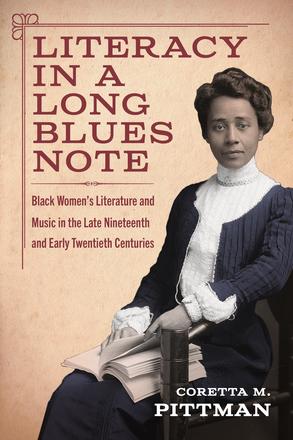
Literacy in a Long Blues Note
Black Women’s Literature and Music in the Late Nineteenth and Early Twentieth Centuries
An analysis of the literary strategies wielded by Black women during the oppressive Jim Crow years
Description
Literacy in a Long Blues Note: Black Women’s Literature and Music in the Late Nineteenth and Early Twentieth Centuries traces the evolution of Black women’s literacy practices from 1892 to 1934. A dynamic chronological study, the book explores how Black women public intellectuals, creative writers, and classic blues singers sometimes utilize singular but other times overlapping forms of literacies to engage in debates on race.
The book begins with Anna J. Cooper’s philosophy on race literature as one method for social advancement. From there, author Coretta M. Pittman discusses women from the Woman’s and New Negro Eras, including but not limited to Angelina Weld Grimké, Gertrude “Ma” Rainey, and Zora Neale Hurston. The volume closes with an exploration of Victoria Spivey’s blues philosophy. The women examined in this book employ forms of transformational, transactional, or specular literacy to challenge systems of racial oppression.
However, Literacy in a Long Blues Note argues against prevalent myths that a singular vision for racial uplift dominated the public sphere in the latter decade of the nineteenth century and the early decades of the twentieth century. Instead, by including Black women from various social classes and ideological positions, Pittman reveals alternative visions. Contrary to more moderate predecessors of the Woman’s Era and contemporaries in the New Negro Era, classic blues singers like Mamie Smith advanced new solutions against racism. Early twentieth-century writer Angelina Weld Grimké criticized traditional methods for racial advancement as Jim Crow laws tightened restrictions against Black progress. Ultimately, the volume details the agency and literacy practices of these influential women.
Reviews
"Coretta M. Pittman has taken on a complex topic with multiple strands to weave together from a wide range of subfields. Highlighting how cultural interventions were shaped by race affiliation and social class, Pittman’s development and illustration of the concept of ‘specular literacy’ provides a productive intersectional perspective to womanist/Black studies and will push literacy studies in new directions."
- Sarah Robbins, author of Learning Legacies: Archive to Action through Women’s Cross-Cultural Teaching
"n this study Pittman (Baylor Univ.} asserts that the highly stylized, written conventions of writers like Anna Julia Cooper, the aural dimension of the folk captured by classic blues singers, and the southern Black folk language in the fiction of Zorn Neale Hurston served to contest racial injustice as well as provide entertainment as a healing balm. In addition to Cooper and Hurston, the representative woman Pittman chose to make her point include Pauline Hopkins, Angelina Grimke, Jessie Fauset, and Gertrude "Ma" Rainey. The author sees in the literature and music of the New Negro Renaissance writers and musi1cians a form of literacy that affirms and honors the oral origins as specular literacy. The volume comprises five chapters, each devoted to classic women writers and blues artists. Pittman notes that in a particularly violent and uneasy time of Black codes and Jim Crow,. the Black women she focuses on had a lot to say and the courage to say it, with the purpose of convincing Black and white audiences that Black people were human, intelligent, and capable."
- B. Taylor-Thompson, CHOICE